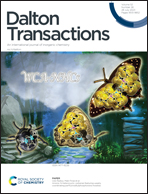Palladium nanoparticles confined in uncoordinated amine groups of metal–organic frameworks as efficient hydrogen evolution electrocatalysts†
Abstract
Hydrogen obtained through the electrolysis of water is a potential solution to the growing demand of human society for energy. In addition, water electrolysis generates less environmental pollution than fossil energy sources. However, the preparation of highly active and low-cost electrocatalysts remains a key challenge. Here, we report a facile and inexpensive method to prepare palladium nanoparticles (Pd NPs) supported on aminated (–NH2) metal–organic frameworks (MOF). The obtained electrocatalyst (Pd@Uio-66-NH2) exhibits excellent electrocatalytic performance for the hydrogen evolution reaction (HER), featuring an ultralow overpotential (34 mV at 10 mA cm−2), small Tafel slope (41 mV dec−1), and superior stability in acid electrolyte. Systematic characterization demonstrated that –NH2 can effectively stabilize palladium acetate as the Lewis base. Meanwhile, the strong interaction between the lone pair electrons and the d-orbital ensures that the Pd atoms are uniformly distributed in the MOF material, inhibiting the agglomeration of metal NPs in the reaction. This strategy provides an avenue to prepare inexpensive and highly active catalysts for HER in acidic media.



 Please wait while we load your content...
Please wait while we load your content...